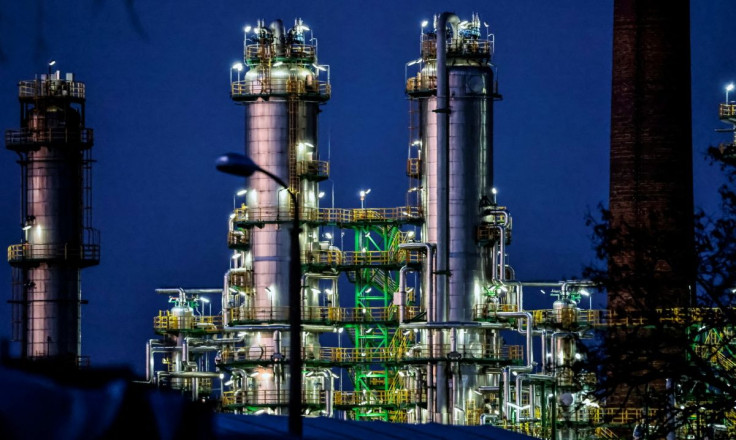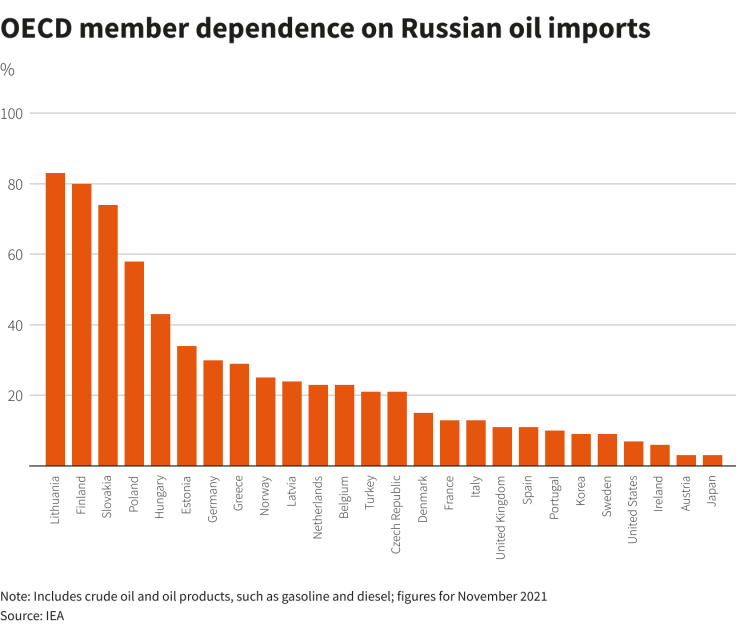Berliners' Reliance On Russian Fuel Exposes German Dilemma On Ukraine

People on the streets of Berlin have waved Ukrainian flags in demonstrations of support since Russia invaded Ukraine in February. But those who drove to the rallies did so largely in cars powered by oil from Russia, which provides most of the fuel to the German capital.
Just over a third of Germany's crude oil came from Russia last year, official data shows. Until the invasion of Ukraine in February, the dependence of Europe's largest economy on cheap energy from Russia - in part, a legacy of the Cold War - was not viewed as problematic by the authorities.
Now, German politicians say it may threaten the country's security and want to wean Germany off Russian oil.
A Russian-owned refinery at Schwedt, a 90-minute drive from Berlin, has become a focus of the debate.
Nine out of 10 cars in the capital and the surrounding state of Brandenberg are powered by its fuel, and 50% of the electricity it generates is fed into the state grid. "We drive Berlin and Brandenburg," the refinery says on its website.
The refinery, PCK Schwedt, is majority-owned and operated by Russian state-owned oil company Rosneft. All the oil it refines comes from Russia.
The refinery was thrust into the political spotlight on the eve of the war by Rosneft's plan to increase its stake substantially, a request that Germany's government has placed under review amid concerns that its energy reliance on Russia has grown too acute.
"It now turns out to have been a mistake to give a Russian state-owned company such a responsibility for the economy," Economy Minister Robert Habeck, of the Greens party, told reporters in late March, when asked about the future of the Schwedt refinery.
A spokesperson for PCK Schwedt did not respond to a request for comment about officials' concerns over fuel security.
The refinery's capacity of 233,000 barrels per day amounts to about one-tenth of Germany's pre-pandemic consumption. The nearby Leuna refinery, owned by France's TotalEnergies and with a similar capacity, also relies on the same pipeline from Russia for most of its oil. [L2N2W50OH]
Graphic: German crude oil imports -

Calls for the 27-nation European Union to impose an outright oil embargo on Russia have gained impetus in recent weeks, after images of civilian killings in Ukraine prompted the International Criminal Court to open an investigation into alleged war crimes.
Moscow, which calls its campaign a "special operation," says it has not targeted civilians.
EU governments said on Monday the bloc's executive was drafting proposals to ban Russian crude but diplomats said Germany - which has already reduced its consumption of Russian oil and gas - was not actively supporting an immediate embargo.
Ukraine's president has said Moscow is making so much money from oil exports that it does not need to take peace talks seriously and has called on Germany to cut its energy ties with Russia quickly.
The Kremlin did not immediately respond to a request for comment.
Opinion polls over the past few weeks show less than half of Germans want to halt the import of Russian oil and gas. Several Berliners buying petrol on a recent morning questioned whether an embargo would hurt Russia.
"It's a conflict of conscience: of course we want to help the Ukrainians but even if we were to accept higher prices, would it actually help them?" said Melanie Barthel, 29.
Berlin's mayor, Franziska Giffey, told German newspaper Handesblatt on April 7 she was worried that such a large share of eastern Germany's fuel supply depended on the Schwedt refinery.
Referring to Schwedt, Giffey told the newspaper there may be cases where nationalisation "is unavoidable." She did not respond to a request for further comment.
Asked about the debate in Germany over whether to halt Russian fuel supplies, Rosneft said in a statement to Reuters it has owned assets there for more than 10 years and has invested 4 billion euros in modernization during that time, helping to lower fuel prices for consumers and to guarantee German energy security.
Rosneft said that any illegal seizure of its assets would be a gross violation of private property rights and would destabilize the investment climate in Germany, jeopardizing the interests of foreign investors.
FROM FRIENDSHIP TO THREAT
The PCK Schwedt refinery, like Berlin itself, used to be the Eastern Bloc during the Cold War. It was built in the 1960s to process Russian oil shipped to satellite states of the former Soviet Union.
The oil is pumped through one of the world's longest pipelines. Its name, "Druzhba", means friendship: Moscow built it to supply its import-dependent allies.
Refineries in Poland, Slovakia and the Czech Republic also rely on Russian oil.
Graphic: Which country most depends on Russian diesel imports? -

After the fall of the Soviet Union in 1991, Western oil companies bought into Schwedt, but Rosneft owns 54% of the plant and controls it.
In March, Germany's Economy Ministry said it was reviewing a plan for Rosneft to purchase Shell PLC's stake in the refinery, which would leave the Russian oil giant holding nearly 92%.
"The Russian attack changed our whole security evaluation," a German government source told Reuters. "In this context, Rosneft's control was considered a possible threat."
The review, a confidential process, comes under a foreign trade law designed to protect German security, technology and intellectual property from non-European Union investors.
People familiar with the situation could not say how long the Schwedt review would take or what Germany would do if it concluded Rosneft's role is a security threat.
Shell said in a statement to Reuters it had been clear about its intent for a phased withdrawal from Russian hydrocarbons following the invasion, and was in discussions with governments about how to maintain supplies to consumers.
"Ultimately, it is for governments to decide on the incredibly difficult trade-offs that must be made," the statement said.
Habeck, the Economy Minister, told reporters this month the government was working flat out to resolve the refinery's situation in order to achieve "oil independence from Russia".
The German government took temporary control of another Russian energy business on April 4: it put Russian gas giant Gazprom's local unit - Gazprom Germania - under the control of the regulator after Gazprom attempted to sell its subsidiary to two other Russian companies.
Gazprom did not respond to a request for comment.
The stalled sale leaves Shell in a quandary. A senior Shell source told Reuters it would be surprising if the German regulator approved the disposal of its stake in Schwedt to Rosneft: "We will have to figure out what to do next, but for now there isn't much we can do," said the source.
The remaining shares in the refinery are owned by Italian oil and gas company Eni SpA, which said it had been looking to sell them before the invasion. After Russia invaded, Eni, like many oil companies, said it would not sign new supply deals with Russia.
ALTERNATIVES
For Germany, replacing Russian oil will be a mammoth task. Germany imports oil through other pipelines, including one from Italy, but Russia is by far its largest supplier. The second biggest, the United States, delivered just 13% of its total imports.
In addition to Schwedt, Rosneft owns minority stakes in two other German refineries and supplies them with some crude, although they also purchase oil from elsewhere.
Finding alternative supplies for PCK Schwedt will be a challenge, industry experts say.
The refinery was built to process Russian urals crude via the Druzhba pipeline and the only other duct supplying it - from the Baltic Sea port of Rostock - can transport just a fraction of the oil it needs.
The Baltic ports receive oil imports from other producers - such as Saudi Arabia and the United States - but Schwedt would have to compete for that as eastern European refineries hunt for alternatives to Russian crude.
Rosneft said in a statement that shifting to alternative crude supplies at Schwedt would increase costs considerably and would raise fuel prices for German consumers.
Graphic: OECD member dependence on Russian oil imports -

© Copyright Thomson Reuters 2024. All rights reserved.




















